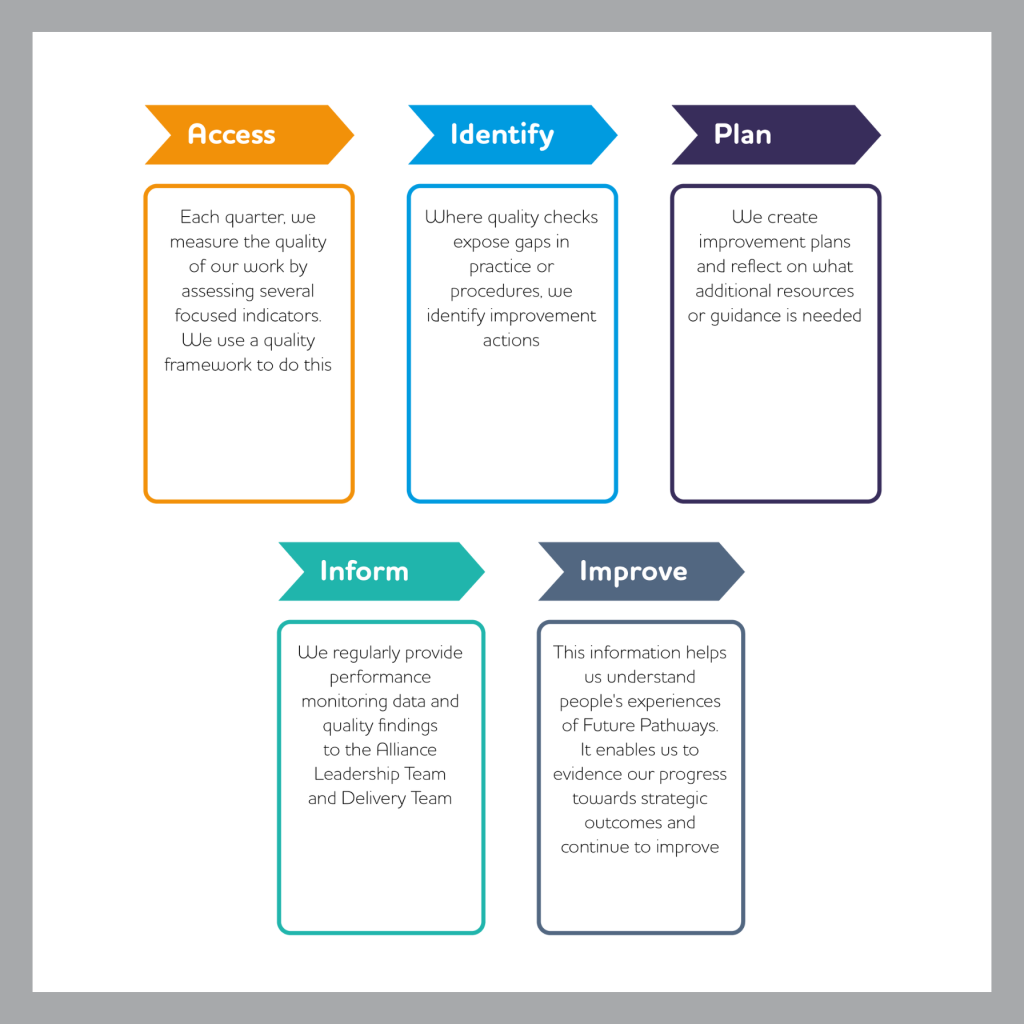Our latest Quarterly Report is now available to view. It covers our work from October to December 2024. It shows what we’ve learnt, and includes key stats and feedback from those who access Future Pathways.
What happened in Q2
51 people registered with Future Pathways.
31 people started working with a Support Coordinator.
142 people were accessing support from at least 39 Delivery Partners.
Who we supported
The average age of people who registered with us was 47.
71% of people who registered with us live in Scotland’s most populated areas.
How people felt
We received positive feedback from people we support, and we also received suggestions for how we could improve.
People shared that they felt Future Pathways understood and cared about them. Many people also shared that they felt able to trust Future Pathways.
People also told us that some experiences such as waiting for support could negatively affect their trust in the service.
What people gained
People accessed a mix of different types of support in Q3. Many people told us they feel able to access the support that is right for them.
Many people accessed support from our Delivery Partners such as creative therapies and support work.
Many people accessed support through our Discretionary Fund such as support to make their home feel safe and comfortable, and support to explore their hobbies and interests.
People also accessed support to link up with existing services such as health and social care supports.
What difference we made
Many people shared the impact of their work with Future Pathways, for example an increase in their hope for the future.
“[Future Pathways] supplied the tools to help me to recover, as best as possible, leave the past behind and for the first time in my 66 years gave me the opportunity to look to the future.”
(Person supported by Future Pathways)
What changed for people
People shared what changed in their life after accessing support from Future Pathways. Some people fed back that they know more now about their strengths and what they can do. They also told us they feel clearer about the changes they want to make with our support.
“It has helped me get to my goals.”
(Person supported by Future Pathways)
Our full report features further infographics, feedback and a breakdown of our financial spend.
Our latest Quarterly Report is now available to view. It covers our work from July to September 2024. It shows what we’ve learnt, and includes key stats and feedback from those who access Future Pathways.
What happened in Q2
48 people registered with Future Pathways.
25 people started working with a Support Coordinator.
At least 97 people were accessing support from at least 35 Delivery Partners.
Who we supported
The average age of people who registered with us was 49.
80% of people who registered with us live in Scotland’s most populated areas.
How people felt
We received positive feedback from people we support, and we also received suggestions for how we could improve.
People shared that they felt Future Pathways understood and cared about them. Many people also shared that they felt able to trust Future Pathways.
7 out of 7 people who answered our feedback forms feel that Future Pathways understands them and their needs.
People also told us that some experiences, like gaps in contact, could negatively affect their trust in the service.
What people gained
People accessed a mix of different types of support in Q2. Many people told us they feel able to access the support that is right for them.
Many people accessed support from our Delivery Partners, such as record search support, creative therapies and support work.
Many people accessed support through our Discretionary Fund such as support to make their home feel safe and comfortable, and to progress outcomes around health and fitness.
People also accessed support to link up with existing services such as housing and healthcare supports.
What changed for people
People shared what changed in their life after accessing support from Future Pathways. Many people fed back that they know more about their strengths and what they can do. They also told us they feel clearer about the changes they want to make with our support.
5 out of 7 people who answered our feedback forms now know what changes they want to make in their life.
What difference we made
Many people shared the impact of their work with Future Pathways.
5 out of 7 people who answered our feedback forms feel more hopeful about their future.
Some people told us they feel their life is better overall since accessing Future Pathways support.
Our full report features further infographics, feedback and a breakdown of our financial spend.
Our latest Quarterly Report is now available to view. It covers our work from April to June 2024. It shows what we’ve learnt, and includes key stats and feedback from those who access Future Pathways.
What happened in Q4
58 people registered with Future Pathways.
8 people started working with a Support Coordinator
102 people accessed support from 39 Delivery Partners.
Who we worked with
The average age of people who registered with us was 48.
72% of people registered with us live in Scotland’s most populated areas.
How people felt
We received positive feedback from people we support, and we also received suggestions for how we could improve.
People shared that they felt Future Pathwyas understood and cared about them. Many people also shared that they felt able to trust Future Pathways.
“They listened – they cared – they supported me.” (Person supported by Future Pathways)
What people gained
People accessed a mix of different types of support in Q1. Many people told us that they feel able to access the support that is right for them.
Many people accessed support from our Delivery Partners, such as record search and psychological support.
Many people accessed support from our Discretionary Fund, such as support to make their home feel safe and comfortable, and to explore their interests.
People also accessed support to link up with existing services, such as social work and healthcare.
What changed for people
People shared what changed in their life after accessing support from Future Pathways.
“They helped to make my day to day living easier.” (Person supported by Future Pathways)
What difference we made
People shared the impact of their work with Future Pathways. Some people gave us feedback that, now, they feel more hopeful about their future.
“You have a way of showing that there is a way forward. [The support] is giving me my life back.” (Person supported by Future Pathways)
Our full report features further infographics, feedback and a breakdown of our financial spend.
Our latest Quarterly Report is now available to view. It covers our work from January to March 2024. It shows what we’ve learnt, and includes key stats and feedback from those who access Future Pathways.
What happened in Q4
53 people registered with Future Pathways.
14 people started working with a Support Coordinator.
157 people accessed support from 47 Delivery Partners.
Who we worked with
The average age of people who registered with us was 52.
83% of people registered with us live in Scotland’s most populated areas.
How people felt
We received positive feedback from people we support, and we also received suggestions for how we could improve.
People shared that they felt Future Pathwyas understood and cared about them.
People also told us that waiting for support and not being able to access material support can be very difficult.
What people gained
People accessed a mix of different types of support in Q4.
Many people accessed support such as trauma support work and psychological assessment from our Delivery Partners.
And many people accessed support through our Discretionary Fund such as support to make home improvements and explore hobbies.
People also accessed support to link up with existing services such as social work and healthcare.
What changed for people
People shared what changed in their life after accessing support from Future Pathways.
“I went from […] not looking after myself to someone who enjoyed getting up in the morning […] Instead of wasting my life away […] I am able to live a life once again.”
What difference we made
People shared the impact of their work with Future Pathways. For some people, this was lifechanging.
“[Future Pathways] made my life totally on a better path that I never thought possible.”
Our full report features further infographics, feedback and a breakdown of our financial spend. Read our full report here.
Our latest Quarterly Report is now available to view. It covers our work from October to December 2023. It shows what we’ve learnt, and includes key stats and feedback from those who access Future Pathways.
What happened in Q3
67 people registered with Future Pathways.
28 people started working with a Support Coordinator.
109 people accessed support from 37 Delivery Partners.
Who we worked with
The average age of people who registered with us was 43.
57% of people registered with us live in Scotland’s most populated areas.
We continue to find that people we support are more likely to live in deprived areas.
How people felt
Most of the feedback we received from people registered with us was positive.
People shared that they felt Future Pathways understood and cared about them.
People also told us that not being able to access material support sometimes can be difficult.
What people gained
Many people told us that counselling, and support to improve their home environment, makes a big difference. Here, John tells us what he gained from accessing mental health support from Future Pathways:
“Before I accessed this support, I didn’t know why I couldn’t function. They helped me figure it out for myself. And I am still figuring it out. But now, I am on that journey.”
What changed for people
People shared what changed in their life after accessing support from Future Pathways.
“My Support Coordinator made a colossal difference in my life.. [Future Pathways] has helped fund a number of programmes which have helped ease my depression and physical ailments.”
What difference we made
People shared the impact of their work with Future Pathways. For some people, this was lifechanging.
“It was night and day compared to with what my life was like […] Future Pathways helped me turn my life around. I started caring about myself, because someone else was caring about me.”
Our full report features further infographics, feedback and a breakdown of our financial spend. Read the full report.
Our latest Quarterly Report is now available to view. It covers our work from July to September 2023. It shows what we’ve learnt, and includes key stats and feedback from those who access Future Pathways.
What happened in Q2
75 people registered with Future Pathways.
33 people started working with a Support Coordinator.
107 people accessed support from 43 Delivery Partners.
Who we worked with
The average age of people who registered with us was 47.
77% of people who register with us live in the Central Belt of Scotland.
Many people who register with us have a disability or a health condition that impacts their daily life and ability to access services
How people felt
Most of the feedback from people registered with us was positive.
Some people expressed appreciation for Future Pathways’ support and told us they felt heard.
People also shared that it is difficult when they cannot access swift and responsive support.
Delivery Partners shared feedback that they feel valued and supported by Future Pathways.
What people gained
People we support said that the most impactful support was accessing mental health support and being able to improve their homes.
Our Delivery Partners shared feedback that they learned about the needs and challenges of people we support by working with Future Pathways.
What changed for people
Anne shares what changes for her after accessing Future Pathways’ support.
“The cinema membership encouraged me to leave the flat and venture into town. When the cinema was quiet, I felt safe, like I didn’t have to scan the place.”
Some Delivery Partners fed back that they had changed how they work because of their work with Future Pathways.
What difference we made
Josie shares the impact of Future Pathways’ support.
“That old life has gone now. I love my life now. I am in a happier place. I’m more me.”
Our full report features further infographics, feedback and a breakdown of our financial spend. Read the full report.
Our latest Quarterly Report is now available to view. It covers our work from April to June 2023. It shows what we’ve learnt, and includes key stats and feedback from those who access Future Pathways.
What happened in Q1
57 people registered with Future Pathways.
15 people started working with a Support Coordinator.
80 people accessed support from 26 Delivery Partners.
Who we worked with
The average age of people who registered with us was 46.
77% of people who register with us live in the Central Belt of Scotland.
We learned that most of the people we support may have a disability or a health condition.
How people felt
Most of the feedback we received was positive.
Some people told us they felt listened to and able to trust the service.
On the other hand, waiting for support can make people feel frustrated, unable to progress and unimportant.
What people gained
People gained access to a wide range of supports.
Accessing mental health supports and exploring creative interests were most helpful.
What changed for people
Someone we supported shared what is different for them:
“It has given me a lot of confidence […] Now I want to give something back.”
What difference we made
Someone we supported shared the sense of purpose they now feel:
“I know I am there for the right reason, to make people realise that they have a voice […] I feel passionate about Voices for a Better Future.”*
Our full report features further infographics, feedback and a breakdown of our financial spend. Read the full report.
Our latest Quarterly Report is now available to view. It covers our work from January to March 2023. It shows what we’ve learnt, and includes key stats and feedback from those who access Future Pathways.
This quarter:
28 people started working with a Support Coordinator.
More people heard about Future Pathways through word of mouth than from anywhere else.
259 people accessed support from our delivery partners.
We worked with 70 active delivery partners.
People told us they wanted to improve their mental health, their living environments and develop new skill.
People told us working with Future Pathways made a positive difference to their lives. For example, by giving them sense of pride in themselves or their achievements, and ways of coping.
People told us where they heard about Future Pathways
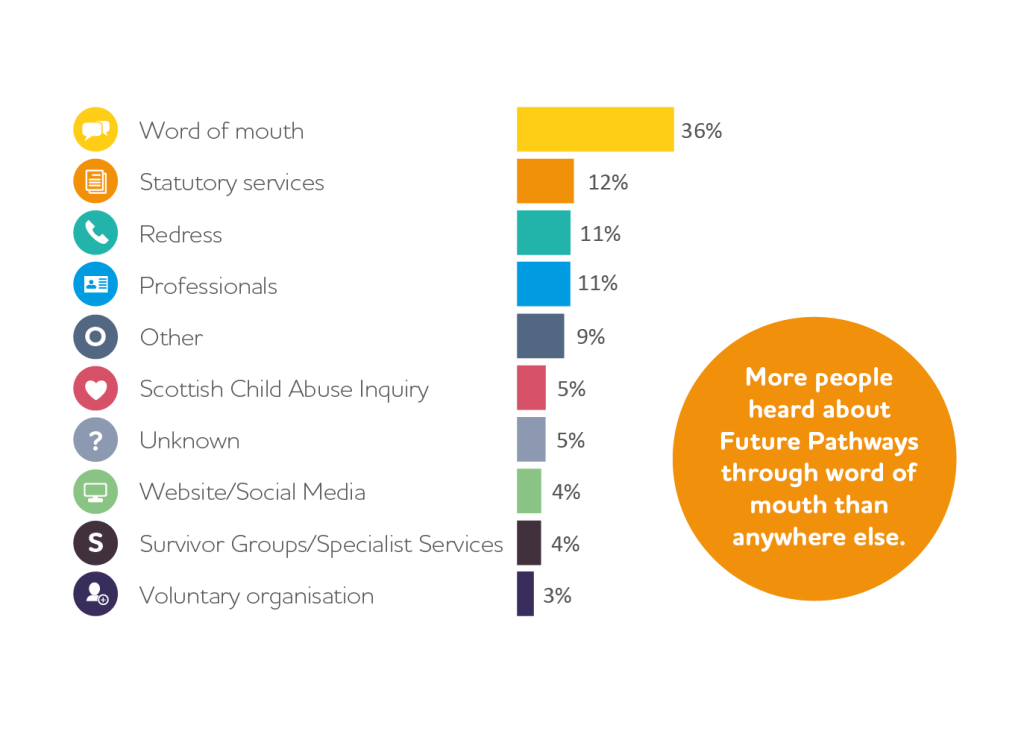
Future Pathways linked people with a range of delivery partners this quarter
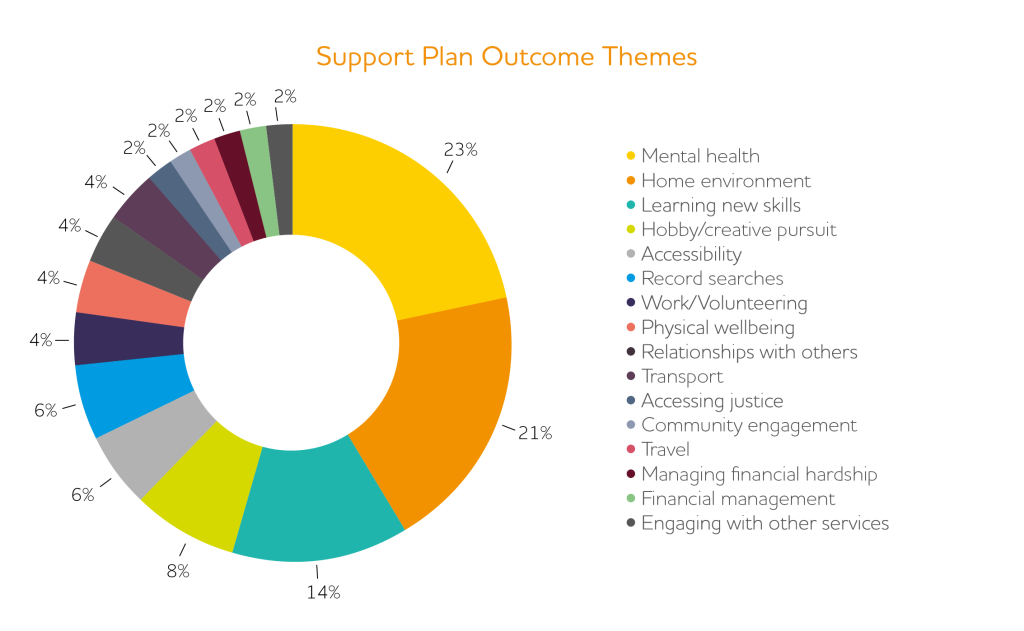
People told us what they hoped to gain from working with our service
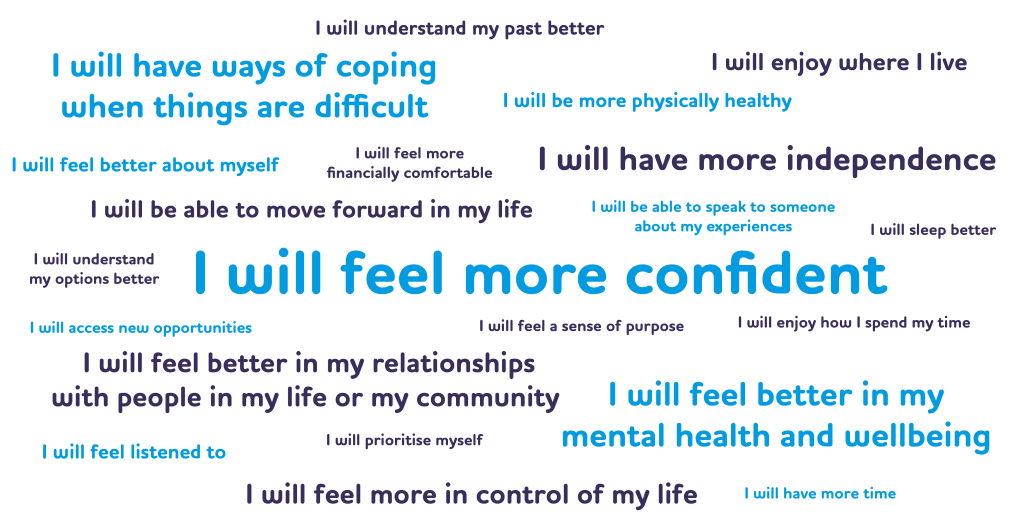
People told us about the most impactful support they accessed through Future Pathways
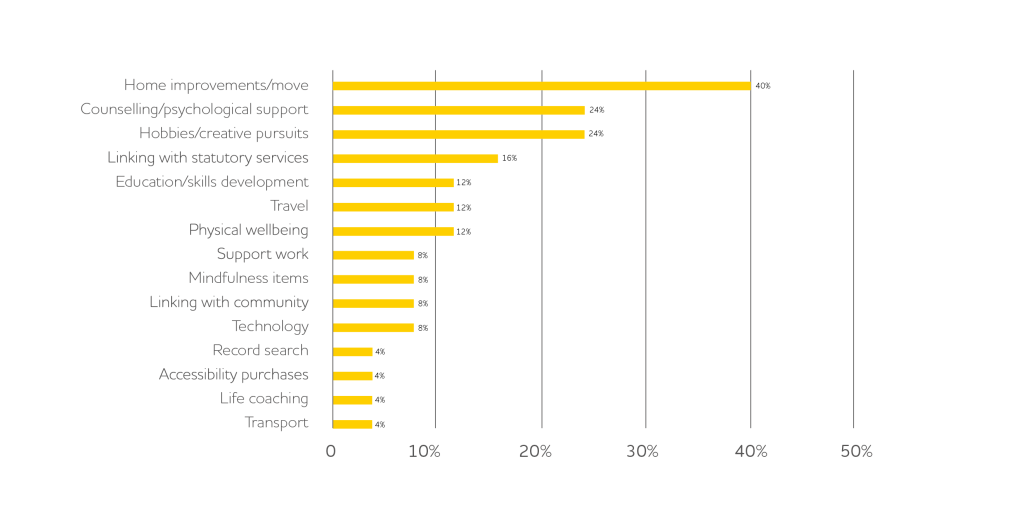
Our full report features further infographics, feedback and a breakdown of our financial spend. Read the full report.
Our latest Quarterly Report is now available to view. It covers our work from October to December 2022. It shows what we’ve learnt, and includes key stats and feedback from those who access Future Pathways.
This quarter:
- 60 people started working with a Support Coordinator.
- Most people heard about us from friends and family, or from statutory services.
- We supported 202 people to access support.
- We worked with 53 delivery partners.
- People shared they wanted to expand their social network and improve their living environment.
- People told us that working with us gave them an increased sense of purpose, independence, and self-awareness.
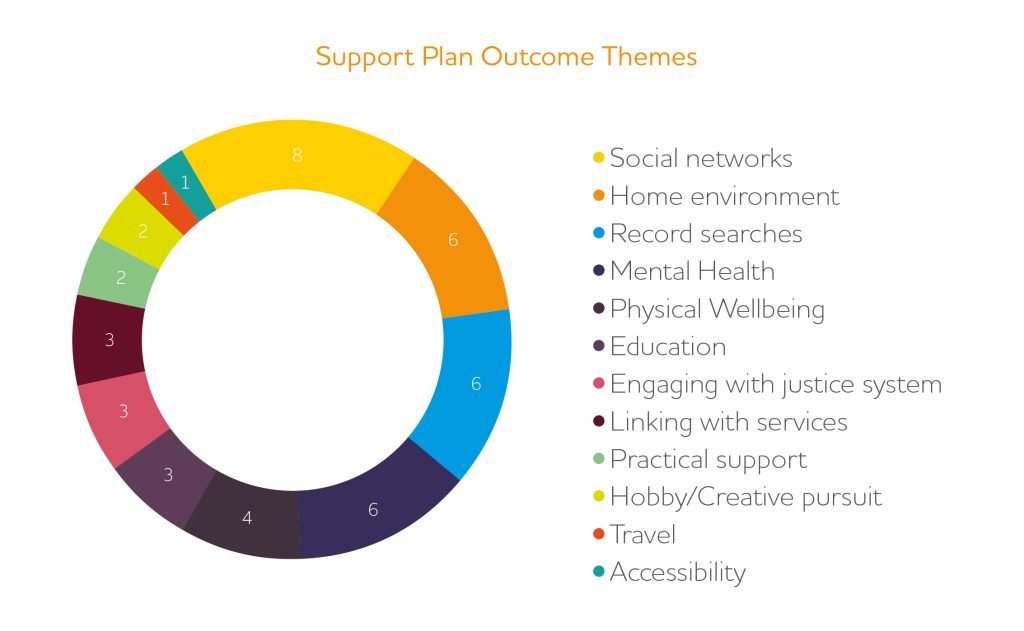
When agreeing a support plan, we ask people what difference they envisage these outcomes having in their lives.
People highlighted that they hoped these outcomes would positively affect their relationships, and their mental wellbeing. The word cloud below shows the themes which emerged from people’s answers.
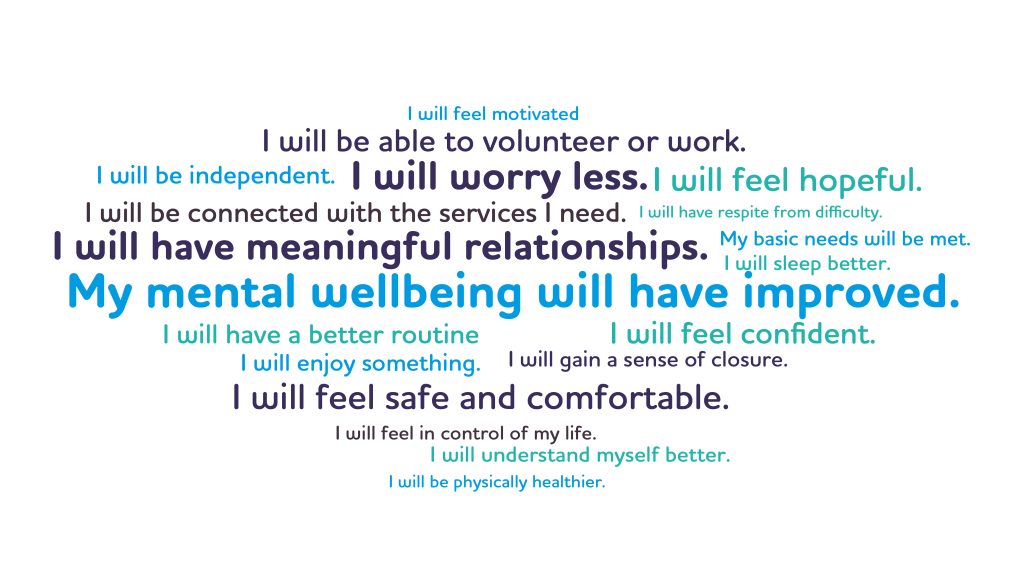
People shared with us how the support can help create a positive outlook
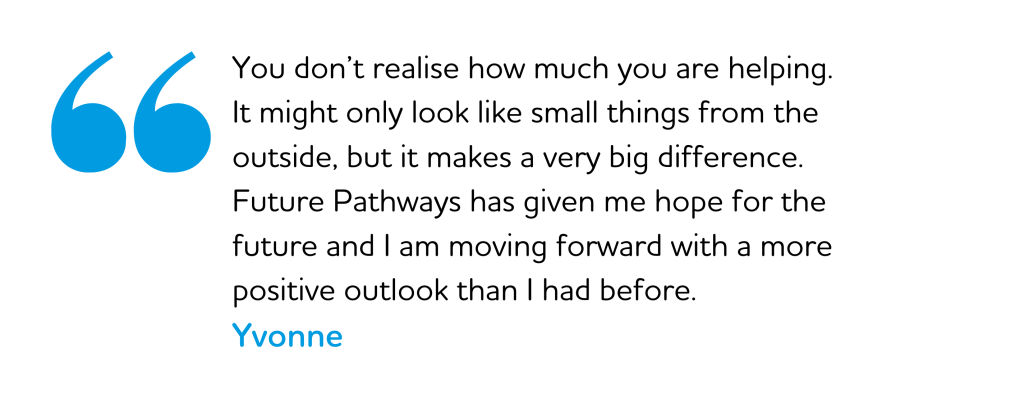
Our full report features further infographics, feedback and a breakdown of our financial spend. Read the full report.
Our latest Quarterly Report is now available to view. It covers our work from July to September 2022. It shows what we’ve learnt, and includes key stats and feedback from those who access Future Pathways.
This quarter:
- We supported 225 people to access support.
- We worked with 62 delivery partners.
- 101 People started working with a Support Coordinator.
- We reduced our waitlist this quarter. No-one has waited for support for more than 6 months.
- People noted that the cost of living crisis is affecting their mental health.
- People told us that working with Future Pathways gave them choice and control. It also helped with managing their mental health.
What support did people seek in Q2?
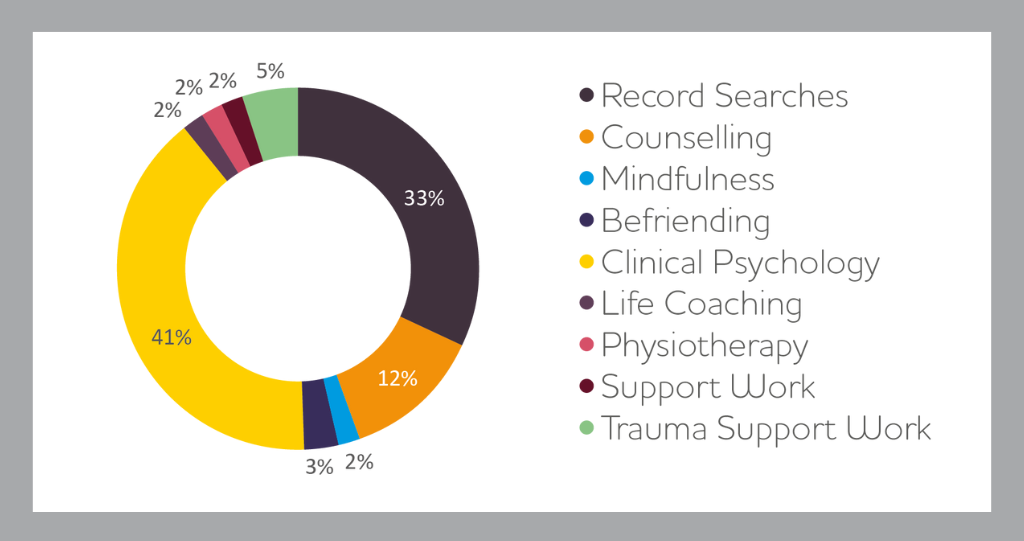
How we are responding to feedback
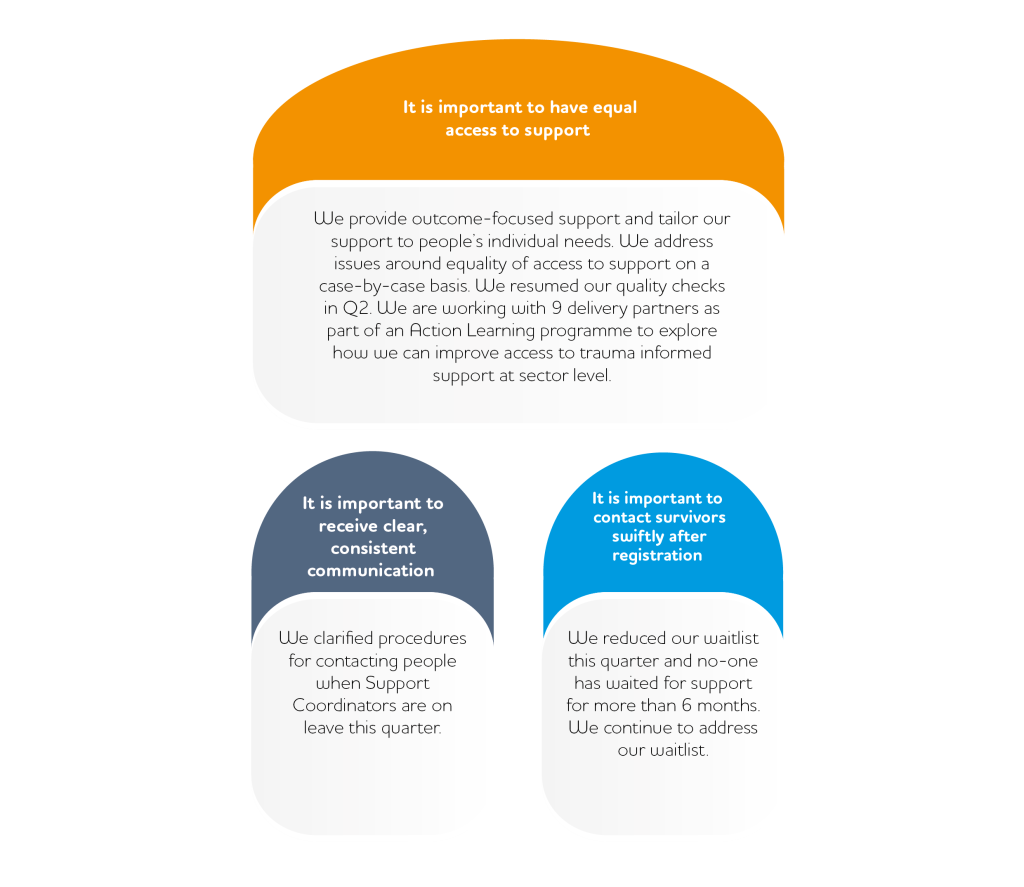
Improving our service
